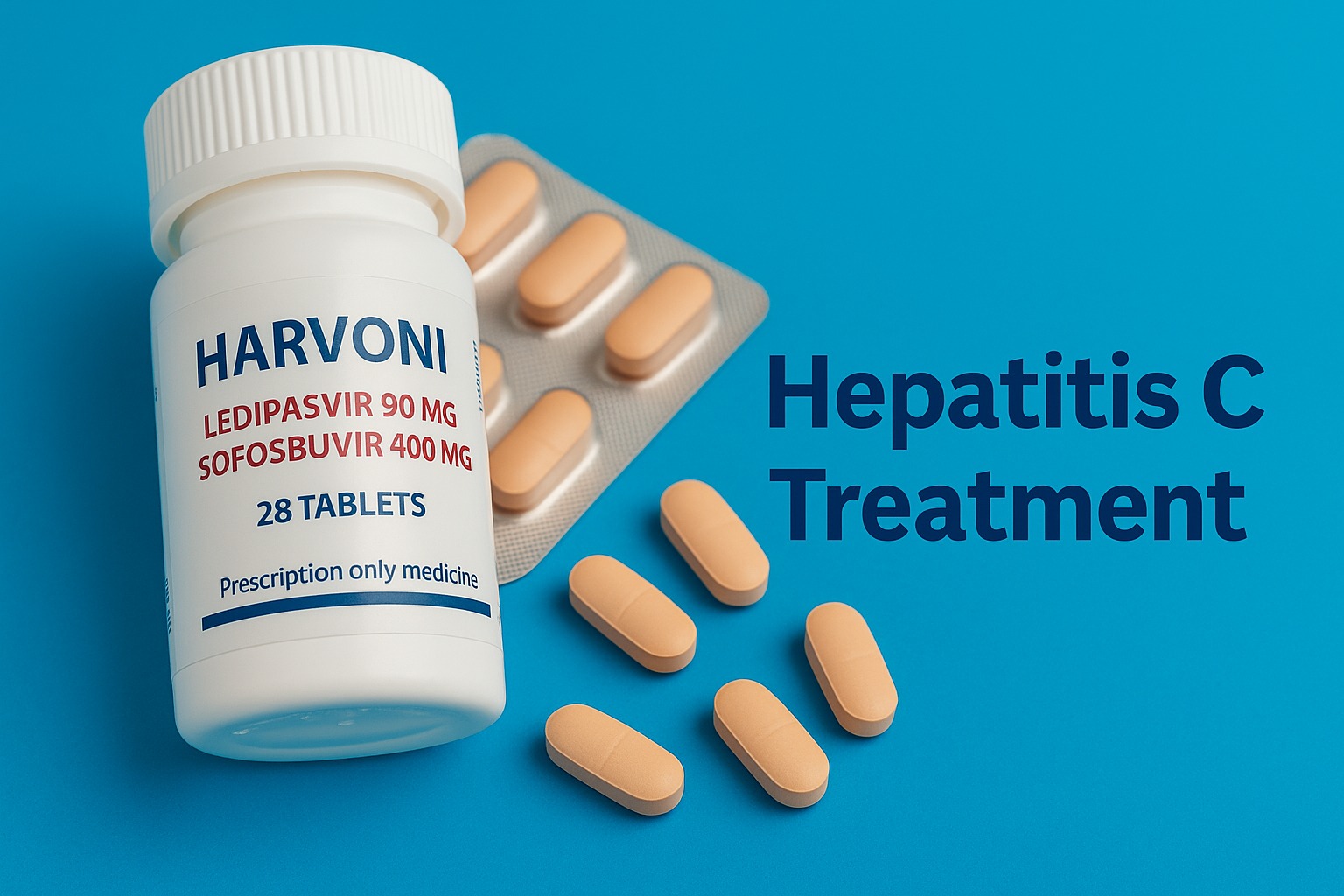Harvoni is a prescription medication used to treat chronic hepatitis C virus (HCV) infection in adults and certain children. Its active ingredients, ledipasvir and sofosbuvir, work together as direct-acting antivirals (DAAs) to block the virus from multiplying. By stopping replication, Harvoni can help clear the infection from the body and, in many cases, achieve a cure.
In this easy-to-read guide, you’ll learn what Harvoni is, how it works, who it’s for, how it’s taken, possible side effects, important precautions, and answers to the most common questions people search online.
Quick disclaimer: This article is for educational purposes only and not a substitute for professional medical advice. Always follow the instructions of your doctor or healthcare provider.
What Is Harvoni?
Harvoni combines two antiviral agents in a single oral tablet:
- Ledipasvir (90 mg) – blocks a viral protein (NS5A) the virus needs to multiply.
- Sofosbuvir (400 mg) – targets another viral protein (NS5B polymerase), stopping viral replication.
This one-tablet, once-daily regimen is considered simpler and more convenient than older hepatitis C treatments.
How Does Harvoni Work?
Hepatitis C spreads by attacking the liver. If untreated, it can cause long-term liver damage, cirrhosis, or even liver cancer.
Harvoni works by directly blocking key steps in the virus’s life cycle:
- Ledipasvir prevents the virus from assembling and spreading.
- Sofosbuvir stops the virus from copying its genetic material.
Together, they make it very difficult for the virus to survive, helping most patients achieve a sustained virologic response (SVR)—meaning the virus is undetectable in the blood 12 weeks after treatment ends. SVR is considered a cure.
Who Can Take Harvoni?
Doctors may prescribe Harvoni for:
- Adults with chronic HCV genotype 1, 4, 5, or 6.
- Children aged 3 years and older with the same genotypes.
- Patients with or without compensated cirrhosis (early-stage liver scarring).
- Some patients who have received a liver transplant.
Your doctor will review your medical history, HCV genotype, and liver condition before recommending Harvoni.
Dosage and Administration
- Standard dose: One tablet (ledipasvir 90 mg / sofosbuvir 400 mg) taken once daily with or without food.
- Duration: Usually 8, 12, or 24 weeks, depending on liver health, prior treatments, and viral load.
- Children: Doses are weight-based and adjusted by a doctor.
Important tips:
- Take Harvoni at the same time each day.
- Do not skip doses. Consistency is critical for success.
- If you miss a dose, take it as soon as you remember unless it’s almost time for your next dose. Do not double up.
Side Effects of Harvoni
Harvoni is generally well tolerated, but some people may experience side effects.
Common side effects include:
- Fatigue
- Headache
- Nausea
- Diarrhea
- Trouble sleeping
Serious but less common side effects:
- Slow heart rate (especially if taken with amiodarone, a heart medicine)
- Worsening of existing liver problems in those with hepatitis B virus (HBV) co-infection
Call your doctor right away if you notice unusual tiredness, chest pain, yellowing skin or eyes, or dark urine.
Warnings and Precautions
Before starting Harvoni, tell your doctor if you:
- Have a history of hepatitis B, kidney, or liver disease.
- Take medications such as amiodarone, certain antacids, rifampin, or St. John’s wort (they can interact with Harvoni).
- Are pregnant or breastfeeding (data is limited, so risks should be discussed with your doctor).
Routine blood tests are usually done before, during, and after treatment to monitor liver function and confirm results.
Harvoni vs. Other Hepatitis C Treatments
- Harvoni: Convenient one-pill daily regimen, highly effective for several genotypes.
- Other options: Epclusa (sofosbuvir/velpatasvir) or Mavyret (glecaprevir/pibrentasvir) may be used depending on genotype and prior treatment history.
Your doctor will choose the best regimen based on your genotype, health condition, and insurance coverage.
Cost, Insurance, and Assistance
Harvoni is a prescription-only brand medication. The cost can be high, but many insurance plans, patient assistance programs, and manufacturer support services may help reduce out-of-pocket expenses. Ask your healthcare provider or pharmacist about available resources.
Popular FAQs
Q1: Is Harvoni a cure for hepatitis C?
Yes, when taken as prescribed, Harvoni can cure most people by achieving sustained virologic response (SVR).
Q2: How long does Harvoni treatment last?
Most people take it for 8 to 12 weeks. Some cases may require up to 24 weeks.
Q3: Can Harvoni be taken with food?
Yes, Harvoni can be taken with or without food.
Q4: Can children use Harvoni?
Yes, it is approved for children aged 3 years and older with certain genotypes.
Q5: What happens after completing Harvoni treatment?
Your doctor will run blood tests 12 weeks after finishing therapy to confirm if the virus is cured.
Final Thoughts
Harvoni has transformed the way hepatitis C is treated. With its once-daily tablet and high cure rates, it offers patients a simpler, more effective path toward recovery. While it’s not right for everyone, Harvoni has given millions of people worldwide the chance to live free from HCV.
Always consult your doctor before starting treatment, follow their instructions closely, and attend all follow-up appointments.


Leave a Comment